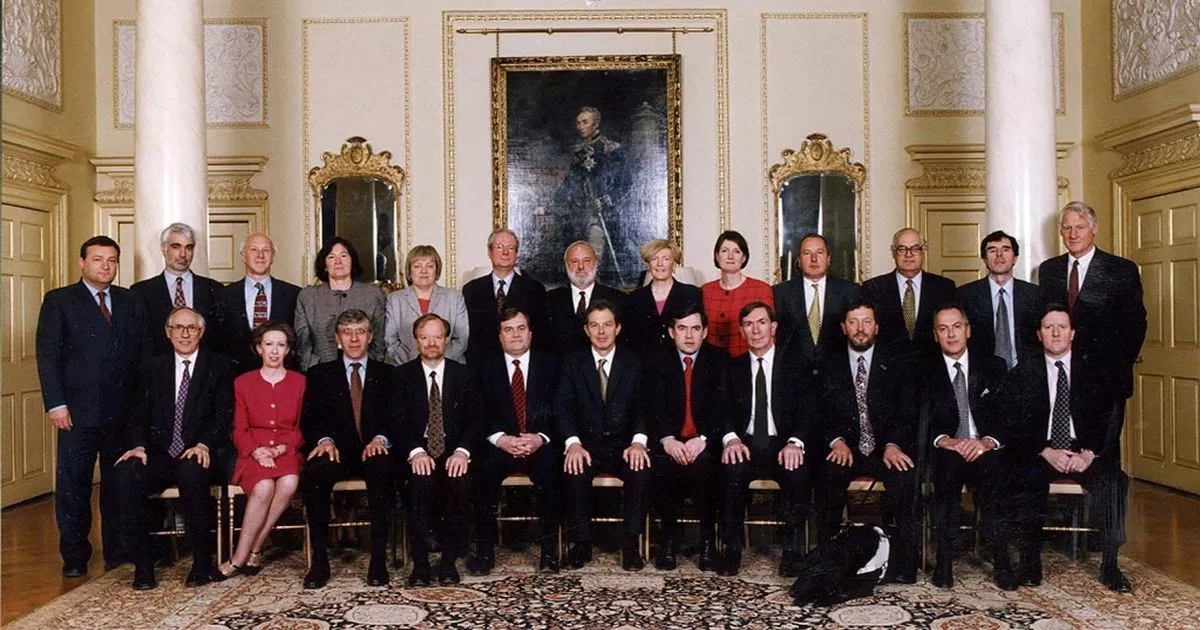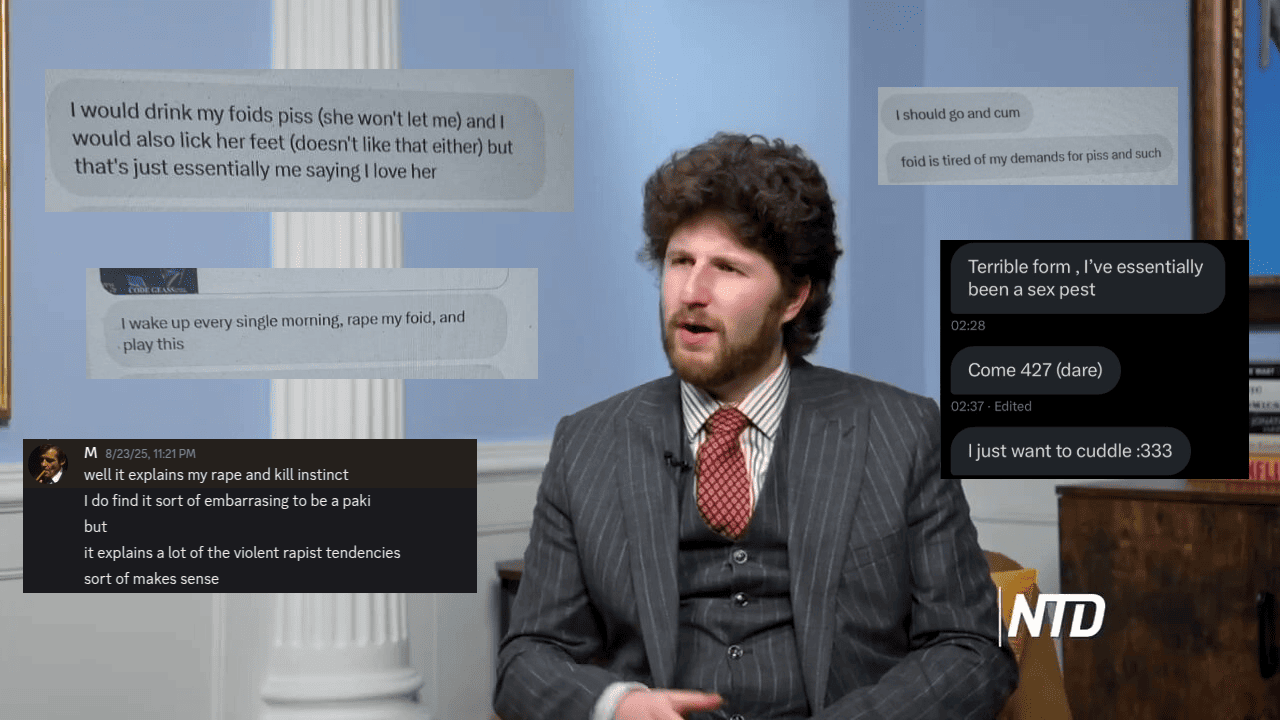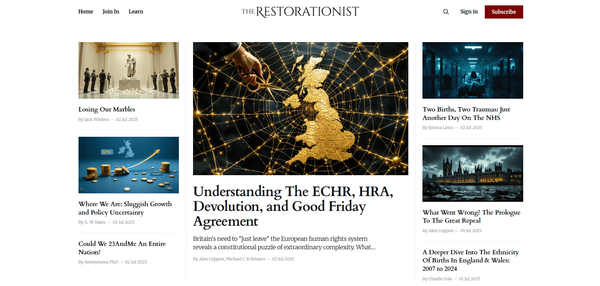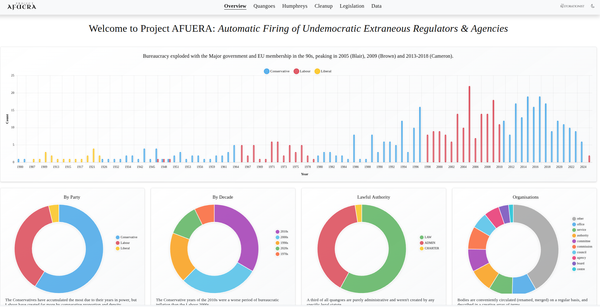Why Did MI5 Wipe New Labour's Eurocommunist Past?

A year after Blair's "New Labour" came to power, MI5 purged 175,000 of its files. The secret lives of Labour cabinet ministers, and the UK's next ambassador to Washington, were shredded. Along with a massive chunk of establishment history. Former radical communists had the slate wiped clean. Or more accurately, wiped their own pasts clean.
Traditional communism collapsed in Europe when the USSR invaded Czechoslovakia in 1968. The communist parties across the Old World could no longer stomach being associated with the Soviet empire and its degenerating ruin of potential utopia. What happened to these communists? They rebranded and embraced different "democratic" Fabian means of advancing their goal: so-called "Eurocommunism" and "Third Way."
One of them, Tony Blair, wrote he "came to Socialism through Marxism" and was so "inspired" by Leon Trotsky it was akin to "coming to religious faith."
Note: cover image by Alan Rhodes
Why Does This History Matter?
In a series of different articles, grumpy granddad and former Trot, Peter Hitchens, has important institutional memory which explains our predicament today. Blair and Starmer's ideas have an origin point. As he points out in the Mail:
I still meet people who think New Labour was ‘right-wing’, when in fact the ideas of New Labour came out of Eurocommunism, social and cultural radicalism stripped of Soviet impediments, and was crammed with former Marxists who weren’t all that former, which is why they don’t like it mentioned to this day.
https://hitchensblog.mailonsunday.co.uk/right-wingness/
He goes into much more detail in the Spectator. Repeated verbosely here due to the paywall limitations, but importance of the content:
New Labour was a triumph of the reborn left, made to seem like a take-over by the right. Its victims happily served and defended it, and still do. How was it done? Clever Marxists had begun to see Soviet communism as an albatross in the 1920s. They knew it would never work in advanced western countries.
It is, as David Aaronovitch’s old comrade pointed out all those years ago, much more interested in sex, in more ways than one. It will cheerfully see the railways privatised, as long as childhood is nationalised, lifelong marriage is made obsolete, Christianity and patriotism are disempowered and defeated, borders are flung wide, and education becomes a mechanism for enforcing egalitarianism.People in the West seldom knew just how interested the old Eastern bloc communist regimes also were in these cultural and moral objectives. The communists loathed lasting Christian marriage and mistrusted all private life. They vigorously promoted abortion and easy divorce. I will always recall, one dark Moscow afternoon, finding a statue to the frightful Pavlik Morozov, whom Soviet children were taught to worship because he had betrayed his parents to the party. If you knew what it represented, it was a bit like stumbling across a graven image of Moloch.
The fall of the Berlin Wall worked in two ways. For it freed Europe’s left-wing revolutionaries from several great burdens. No longer were they agents of a menacing foreign power, or apologists for the Gulag, the Red Army and the Kremlin. They were back to the bright, dangerous enthusiasms of the Young Marx, utopian social radicals anxious to begin the world over again, Jacobins much more than they were Leninists. Yet somehow they managed to portray themselves to naive, politically illiterate media folk as a sexier, better-looking version of the Tories.Well, they were not Tories.
I know of at least six members of the Blair cabinet who to this day would prefer not to talk much, if at all, about their days in the ranks of hardline Marxist organisations. People who now go into frenzies about the leftist past of Jeremy Corbyn and John McDonnell have always ignored this aspect of New Labour and refuse to see any importance in it.
"What Happened To Communism?" in The Spectator
https://www.spectator.co.uk/article/what-happened-to-communism/
https://archive.ph/vJNmw#selection-1775.0-1779.379
These are extraordinary claims, and Hitchens rarely bluffs. Blair as a Trotskyist at Oxford? Yes. He said on the BBC. Which we'll outline later.
A more readable for the wives of Whitehall is published in the Daily Mail around 2018, where he mentions the fascinating book "The Secret State" by Peter Hennessy (https://www.amazon.com/Secret-State-Preparing-Worst-1945-2001/dp/0141044691).
It started with the strategy of entryism.
On a long-ago evening soon before the end of the Second World War, the leader of the Communist Party of Great Britain, Harry Pollitt, travelled to Cambridge to speak to Left-wing students. He had a brusque, unexpected message for them. He didn’t want them wasting their time selling the Daily Worker on street corners and going on rallies and marches. He didn’t want them to become open Communists. He wanted them to work their way into every corner of the British establishment and pursue the revolutionary cause.
And reveals an absolutely staggering claim which is backed up in "Spycatcher" by Peter Wright.
Later, Johnny Torode [Trade Unionist] sickened, at least for a time, of the [Marxist] cause. His son [distinguished journalist John Torode] has told me of the time when, disgusted by Stalinist show-trials in Prague in 1953, his father threatened to reveal what he knew to MI5.
Harry Pollitt, still leader of Britain’s Communists at the time, jeered at him: ‘Don’t be silly, Johnny. You know we run British intelligence’.
This jibe, truer than anyone then knew, backfired. Johnny gathered together his files and gave them to the CIA’s London station instead.
We were later to find out the head of MI6's Soviet desk was Kim Philby. And MI5's senior staff (e.g. Roger Hollis) were under suspicion. What was going on?
‘Moscow Gold’ was never a myth. Well into modern times, Soviet Embassy officials would leave bags of used banknotes at Barons Court underground station in London, to be collected by the Communist official Reuben Falber, who stored them in the loft of his bungalow in Golders Green, North London.
But what is crucial to understand, he says, is:
But 1968 did not kill off Communism. It began a new movement – Eurocommunism, which renounced Soviet methods but kept the key aims of transforming our society. We were not Stalinists. We mostly despised the Soviet Union. The invasion of Prague in 1968 was fresh in our memories. What happened to us all?
We were modern, post-1968 funky Marxists who believed in cultural and sexual revolution, in open borders and in the European Community (one of whose founders, Altiero Spinelli, was a veteran Italian Communist).
Several members of Blair’s Cabinet were active Marxists in the 1968-1990 period.
The theorists of New Labour actually gathered round a magazine called Marxism Today, officially published by the Communist Party, really the forum for Eurocommunists and cultural revolutionaries. Their ideas were incredibly ambitious.
It is said the Devil’s cleverest achievement has been to persuade us that he does not exist. Nothing like as clever, in my view, as the Blairites’ success in persuading us that they are harmless moderates.
He mentions the following CABINET members were radical communists:
- Lord John Reid (defence secretary)
- Bob Ainsworth (also defence secretary)
- Alistair Darling (chancellor)
- Alan Milburn (health secretary)
- Stephen Byers (trade secretary)
- Peter Mandelson (the Dark Lord's assistant, and new ambassador to Washington)
- Tony Blair (the Dark Lord)
But first, a little history to explain what these students were reading about in their radical time at Oxford.
Europe's Communist Parties in 1967
The Soviet Communist Party under Leonid Brezhnev was asserting its leadership role after Khrushchev's ouster in 1964, and becoming increasingly concerned about ideological deviation within the communist movement, particularly regarding the Chinese split and the independence shown by some Western European parties. Communism was fracturing and splintering.
Things were getting messy:
- These "child" parties needed to operate within established democratic systems
- Western Europe was getting prosperous from American capitalism
- The "New Left" and military student movement was emerging
The Italian Communist Party (PCI), led by Luigi Longo, maintained Europe's largest communist party membership outside the Eastern Bloc, with over 1.5 million members, and had established a relatively independent position from Moscow. It developed what became known as "polycentrism" - the idea that different countries could pursue their own paths to socialism
The French Communist Party (PCF), while traditionally closer to Soviet positions, was also beginning to show signs of independent thinking under Waldeck Rochet's leadership. It commanded significant electoral support and union influence, though it was somewhat isolated in French politics.
Under Santiago Carrillo's leadership, the Communist Party of Spain (PCE), operating in exile due to Franco's dictatorship, had begun questioning orthodox Soviet positions. The party was starting to articulate a vision of socialism that would be compatible with political pluralism and civil liberties do to the need to appeal to Spain's growing middle class and intellectual circles.
The Swedish Left Party, under C.-H. Hermansson's leadership since 1964, had begun distancing itself from Moscow and developing a more independent Swedish road to socialism.
The Greek Communist Party (KKE) was illegal and divided between an external leadership in exile and an internal resistance movement, dealing with the aftermath of a military coup. They were ready to split.
In Czechoslovakia, the Communist Party under Antonín Novotný was facing mounting criticism from both reformist elements within the party and the general population. Economic stagnation and cultural restrictions were creating significant discontent.
The Hungarian Socialist Workers' Party under János Kádár implemented his "Goulash Communism," allowing limited economic reforms while maintaining political orthodoxy.
The Polish United Workers' Party under Władysław Gomułka was becoming increasingly conservative, moving away from the reforms he had initially promised in 1956.
Walter Ulbricht's Socialist Unity Party (SED) of East Germany consolidated its power after building the Berlin Wall in 1961 and maintained a hardline stance. The SED was particularly resistant to reforms, fearing they could threaten its control and relationship with the Soviet Union.
The British Communist Party (CPGB) had 30,000 members, iand was based in the trade union movement. The CPGB's leadership, including John Gollan as General Secretary, was generally loyal to Moscow but faced growing internal debates about the party's direction. Some members, particularly intellectuals associated with the journal "Marxism Today," were beginning to question traditional communist orthodoxies. The party was also dealing with the challenge of relating to Labour's (Fabian) left wing, which often competed for the same working-class support base. (More on the CPGB here: https://spartacus-educational.com/Pcommunist.htm)
What Happened In 1968?

Czechoslovakia entered the 1960s facing serious economic problems. The rigid central planning system was showing its limitations, with industrial growth slowing and living standards stagnating. The pressure for reform within the Communist Party of Czechoslovakia (KSČ).
The party's leader, Antonín Novotný, resisted free market reforms, but his position was weak. In January 1968, the KSČ's Central Committee replaced him with Alexander Dubček as First Secretary, who introduced "socialism with a human face." It promised markets, freedom of speech and media, increased cultural freedom, internal party democracy, and autonomy for Slovakia (Dubček's home region) more autonomy.
This warmly-received change became known as the "Prague Spring."
The Italians and Spanish strongly supported it. The British, French, and more hardline types were divided or hostile.

The Soviets arrived to crush it.
In the early hours of August 21, 1968, around 250,000 Warsaw Pact troops and 2,000 tanks crossed into Czechoslovakia. The invasion force included soldiers from the Soviet Union, Poland, Hungary, and Bulgaria. Soviet soldiers had been told they were coming to stop a "counter-revolution," were confused to find normal life and no signs of the claimed Western threat.
The invasion was carefully planned to be swift and overwhelming. Soviet airborne units first seized Prague's Ruzyně airport, allowing them to fly in additional forces directly into the capital. Meanwhile, ground forces crossed the borders from all directions - from East Germany in the northwest, Poland in the north, the Soviet Union in the east, and Hungary in the south. The Czechoslovak army, following orders from President Ludvík Svoboda and party leader Alexander Dubček to limit bloodshed, did not resist.
Throughout the country, ordinary citizens painted over street signs to confuse the invading forces, engaged in arguments with Soviet soldiers, and covered city walls with anti-invasion slogans. The Soviet forces quickly arrested Dubček and other reform leaders, flying them to Moscow.
The imprisoned Czechoslovak leaders were pressured into signing the "Moscow Protocol." which allowed them to return to their positions temporarily but required them to roll back many reforms and accept the permanent stationing of Soviet troops in Czechoslovakia. Over the following months, the reform movement was systematically dismantled in a process called "normalization."
The invasion shocked many Western European communists, who had to confront the reality of Soviet tyranny. The Italian and Spanish parties strongly condemned the invasion. Romania's Nicolae Ceaușescu refused to participate. Most ruling communist parties officially supported the invasion.
What the USSR did effectively ended communism in Europe.
What Was Eurocommunism?
Communism, like Satan, is a shape-shifting virus which gives itself new names, and co-opts fashionable trends to lure in cult members who haven't gone to church for a while and lack a sense of purpose and validation.
The term itself was coined by journalist Franco Barbieri in 1975 and popularised by major communist leaders like Enrico Berlinguer of Italy, Santiago Carrillo of Spain, and Georges Marchais of France, all who thought Antonio Gramsci was right.
The theoretical foundations of Eurocommunism drew heavily from his writings, particularly his Prison Notebooks. Gramsci's concept of "hegemony" suggested that revolutionary change in Western societies required winning leadership in civil society rather than just controlling state institutions.
Santiago Carrillo's "Eurocommunism and the State" (1977) was perhaps the most comprehensive theoretical statement and argued that in advanced capitalist societies, the path to socialism must go through the expansion of democracy rather than its destruction. Communists must work within existing democratic institutions while transforming them.
Entryism, in a word.
The Italian Communist Party's theoretical journal "Rinascita" became an important forum for developing Eurocommunist ideas. Under editors like Luciano Gruppi, it published crucial debates about democracy, socialism, and the role of communist parties in Western Europe (e.g. the "Historic Compromise" strategy). Christine Buci-Glucksmann's work "Gramsci and the State" (1975) helped connect Gramscian theory to contemporary Eurocommunist practice. Other thinkers included Pietro Ingrao and Fernando Claudín.
Eurocommunism, a product of the Prague Spring, proposed several key innovations to old school Soviet tyranny communism:
- It rejected the "dictatorship of the proletariat" in favour of democratic socialism;
- It abandoned democratic centralism for internal party democracy;
- It accepted political pluralism and the possibility of peaceful alternation of power;
- Most importantly, it asserted the need for socialism to expand rather than restrict democratic rights and institutions.
Side note: Tony Blair interestingly said in a 2021 article for the New Statesman:
“Defund the police” may be the left’s most damaging political slogan since “the dictatorship of the proletariat”.
https://www.newstatesman.com/politics/uk-politics/2021/05/tony-blair-without-total-change-labour-will-die
In Italy, the PCI under Berlinguer developed the strategy of "Historic Compromise" seeking broad alliances. In Spain, the PCE under Carrillo emphasised democratic credentials to gain legitimacy after Franco's death. In France, the PCF's embrace of Eurocommunism was more tentative.
The economic crises of the 1970s made its gradual approach seem inadequate to many activists. Internal tensions emerged between those who saw Eurocommunism as a tactical adjustment and those who viewed it as a fundamental theoretical revision. The movement's emphasis on electoral politics sometimes alienated more militant party members.
How Many Of The Labour Cabinet Were Affiliated With Communism?
In the 1980s, the defeated left-wing and the Labout party of Michael Foot decamped around the Communist Party's radical magazine for intellectuals, "Marxism Today." Recently, Colm Morphy published a fascinating article on its lesser known rival in the Labour party's annals: "The Forgotten Rival of Marxism Today: The British Labour Party’s New Socialist and the Business of Political Culture in the Late Twentieth Century".
The journal was, after all, sustained by the ‘Eurocommunist’ wing of the Communist Party of Great Britain (CPGB)—in other words, by one faction of an electorally irrelevant party.6 In the early 1980s, the CPGB’s membership was only a few thousand higher than that of Trotskyist rivals such as Militant Tendency, and it was clearly dwarfed by Labour. The CPGB did possess outsized influence in the media, in academia and (especially) in the trade unions, but its marginality in votes and public office-holding means that we should not exaggerate its relevance. Moreover, while cursed with many other flaws, the 1980s left was blessed by a markedly vibrant and diverse print culture, ranging from the old stalwarts, such as Tribune and the New Statesman, to disrespectful upstarts such as The Militant, Spare Rib and Race Today. As Jonathan Davis and Rohan McWilliam suggest, the energetic print culture of the 1980s left needs more historical scrutiny.7 Such an investigation must look beyond Marxism Today, which, while undeniably important, was only one publication among many.
https://academic.oup.com/ehr/article/138/593/871/7395360
It's impossible to know how many of our politicians, civil servants, and MPs have communist backgrounds, because of the secrecy involved in their membership and the destruction of records by the security services. But one place we can start looking is their print culture.

In 2002, Peter Oborne noted the influence of the CPGB on New Labour in the Guardian:
The influence of the Communist Party on New Labour has been neglected. One day it will be an important subject for a dissertation or PhD by a university graduate. It is not merely the case that a significant number of figures in the Government machine - John Reid, David Triesman, Peter Mandelson, Charlie Whelan to name a few - belonged to the Communist Party of Great Britain in all its King Street grandeur.
Many others - Stephen Byers and Alan Milburn among them - were connected in one way or another with the obscure sub-Marxist organisations that abounded in the 1970s, doing their best to tear down capitalism. Even those, like Jack Straw, who had no Marxist sympathies at all, were obliged to come to terms with communist methods and adversaries in the shadowy internecine struggles of the 1970s and 1980s. It is these methods - as opposed to the now despised Marxist dogma about ownership of the means of production - that have endured to influence the Blair Government. Millbank admittedly borrowed its technology - rebuttal units, the Excalibur computer etc - from the United States. But the obsessive secrecy, centralisation and intolerance of dissent which were such overwhelming characteristics of the Millbank operation reek of the CPGB.
David Triesman was a significant figure of the Euro-communist movement of the 1970s, an attempt to give communism a 'human face'. Thirty years on and he is attempting a comparable exercise with New Labour.
https://www.theguardian.com/politics/2002/aug/25/labour.tonyblair
https://tandfonline.com/doi/full/10.1080/13619462.2024.2305434
Triesman is now a Baron, and a member of the House of Lords: https://en.wikipedia.org/wiki/David_Triesman,_Baron_Triesman
Whelan's career ended in ignominy and disgrace: https://en.wikipedia.org/wiki/Charlie_Whelan
Hitchens made a concise list:
- Tony Blair: a "Trotskyist at Oxford in the 1970s" and "one of his closest friends was in the IMG" - multiple sources: https://www.telegraph.co.uk/news/2017/08/10/tony-blair-reveals-toyed-marxism-trot-student/
- Peter Mandelson: "beyond doubt joined the Young Communist League"
- John (now Lord) Reid: "beyond doubt a Communist Party member."
- Bob Ainsworth: "a ‘candidate member’ of the International Marxist Group (IMG) in the 1980s"
- Alistair Darling: "an active sympathiser of the IMG in Edinburgh in the 1970s"
- Alan Milburn: "‘mixed up’ in the IMG in the 1980s, in an interview with The Independent in June 2000."
- Stephen Byers: "outed by the Guardian in January 1999 as a one-time supporter of the Trotskyist Militant tendency"
The New Statesman goes into much greater detail, reprinted verbosely here for when these embarrassing details go missing in future:
John Reid, another future Labour cabinet minister, was also a member of the Soviet-aligned Communist Party of Great Britain. “He told us he was a Leninist and Stalinist,” Jim White, a fellow party member later recalled. “Although I was suspicious about his transition, we couldn’t tell if he was acting. We let him join.”
Others, dismayed by the Soviet Union’s degeneration, were drawn to Trotskyism. Future chancellor Alistair Darling was a supporter of the International Marxist Group, the sect to which soixante huitard Tariq Ali belonged. “When I first met him [Darling] 35 years ago,” George Galloway once recalled, “Darling was pressing Trotskyite tracts on bewildered railwaymen at Waverley Station in Edinburgh. He was a supporter of the International Marxist Group, whose publication was entitled the Black Dwarf. Later, in preparation for his current role he became the treasurer of what was always termed the rebel Lothian Regional Council.”
Stephen Byers, the future transport secretary and Blairite-ultra, was a supporter of Militant, the entryist group later expelled from Labour by Neil Kinnock. Alan Milburn, who served as health secretary under Blair, was another youthful Trotskyist, running Marxist bookshop Days of Hope (known to locals as “Haze of Dope”).
Tony Benn, a rare example of a politician who moved leftwards with age, regularly cited the lessons of Das Kapital and the Communist Manifesto. Asked to name the “most significant” influences on his thought in 2006, John McDonnell (who was then standing for the Labour leadership) replied: “The fundamental Marxist writers of Marx, Lenin and Trotsky, basically.”
https://www.newstatesman.com/politics/2017/08/tony-blair-isnt-only-new-labour-figure-far-left-past
Blair's confession (“Like many middle class people I came to Socialism through Marxism”, 1982 letter to Michael Foot, unearthed in 2006, New Statesman) is startling, and the reading is extraordinary - the above Telegraph article alone from 2017 is mind-boggling.
Mr Blair said he was inspired to enter politics by the example of Trotsky after he stayed up all night and read a biography after playing a gig with his student rock band Ugly Rumours.
“I think it’s a very, very odd thing, just literally it was like a light going on. And even though, you know, over time I obviously left that side of politics behind, the notion of having a cause and a purpose and one bigger than yourself or your own ambition, and I think probably allied at the same time to coming to religious faith, that changed my life in that period.”
When asked if it would have been fair to have described him as a “Trot”, he replied: “Yeah, in that sense I was actually.”
Mr Blair said the phase was “reasonably brief” and “wasn’t longer than a year probably”.
Huh?
Pardon me?
The prime minister was "inspired to enter politics" by radical communist Leon Trotsky as a life-changing religious experience? But don't worry, it only lasted a year?
Why Did MI5 Wipe History In 1998?
In 1997, MI5 was involved in one of many rows (see: https://www.theguardian.com/theguardian/2009/mar/05/guardian-letters1) about whether or not it had bugged the phone of Peter Mandelson, now the new ambassador to the US in 2024. In his youth he was a radical communist. The dissident exile spy, David Shayler, wrote to the Guardian to say he'd read the file.

IT HAS been brought to my attention (Mandelson wants MI5 files pulped, September 22) that Stephen Lander, the head of MI5, has tried to charm Peter Mandelson and Jack Straw into believing that MI5 did not intercept Mr Mandelson's phone in the 1970s.
I would like to state for the record that I read and summarised both volumes of Mr Mandelson's personal file and, included in that summary, a record of the product from the intercept of Mr Mandelson's phone. As I have said before, there was no indication that Mr Mandelson's activities were anything other than legitimate political protest.I mention this now for the same reason that I mentioned it then. It is not morally, nor indeed financially, justifiable for MI5 to invade the privacy of political activists if their actions do not threaten the democracy of the state.
https://go.gale.com/ps/i.do?id=GALE|A76204117&sid=sitemap&v=2.1&it=r&p=AONE&sw=w&userGroupName=anon~b93e97d2&aty=open-web-entry
This was bought up in Parliament: https://api.parliament.uk/historic-hansard/commons/1998/feb/25/security-service-files
Fast-forward a decade to 2009, Hitchens explained to the Guardian he applied to see his own MI5 file.
After the Home Office said (in January 2002) MI5 could not refuse to open personal files unless there was a national security risk, I applied to see the security service's files on my long ago Trotskyist activities. I received the same letter as the one sent to Professor Hobsbawm. I then pursued the case to the Information Tribunal, with no success.
In both cases, there is clearly no good reason for continued secrecy. I suspect most files of this kind were culled in 1998, in a general clear-out, apparently aimed at saving New Labour from embarrassment. The destruction of cold war files on "subversives" was specifically asked for by Peter Mandelson in September 1997, after claims by David Shayler that MI5 had kept records on the then Mr Mandelson and on Jack Straw, among others. The destruction was stated to be under way by January 1998.
https://www.theguardian.com/politics/2009/mar/03/mi5-file-access
Statewatch reported in 1998 that Jack Straw began the memory holing super-wipe of British state history, revealing the incredible scale of security issues in the UK:
Home Secretary Jack Straw announced in July that MI5 destroyed 175,000 files in the period between its formation in 1909 and the early 1970s. File destruction then ceased because of concerns that investigations into espionage cases had been impeded. But the file destruction programme was resumed following the end of the cold war in the early 1990s. Since then, more than 110,000 files have either been destroyed or earmarked for destruction. The latest revelations follow Straw's announcement in February 1998 that he was allowing MI5 to decide for itself which files to destroy, and which to keep for operational, statutory or historical reasons (see Statewatch, vol 8 no 2).
The destruction figures suggest that MI5 has, since 1909, compiled over 925,000 files on individuals and organisations for one purpose or another, a figure which is equivalent to 1.6 per cent of the current UK population. The Police National Computer currently holds information on 5.7 million individuals, or about ten per cent of the population. MI5's present file holdings are said to be "about 440,000", of which 230,000 are "closed", meaning that "Security Service officers may use them where necessary in the course of their current work, but may not make inquiries about the subjects of the files". Around 35,000 files relate to matters internal to the Service, including personnel. Another 75,000 files relate to people or groups who have received protective security advice but have never been the subject of direct investigation by the Service. The remaining 100,000 files consist of 40,000 subject/organisation files and 40,000 files which have been reduced to microfilm and placed in a "restricted" category "to which Security Service staff have access only for specific research purposes". This leaves 20,000 "live" files relating to individuals who "may be under current investigation". The table below indicates that the majority of these files concern "terrorists"
https://www.statewatch.org/statewatch-database/uk-mi5-s-file-destruction-programme/
https://www.statewatch.org/statewatch-database/uk-mi5-historical-files-being-destroyed/
Also: http://news.bbc.co.uk/2/hi/uk_news/politics/141876.stm
Which leaves us with a rather important question, doesn't it? Many, in fact. Particularly what we know about the disaster Britain has become. Keir Starmer is Darth Blair's protege and Mandelson is back.
What did those files contain, and how "embarrassing" were they to "New Labour"? How much damage has been allowed to happen to Britain because these people were allowed to wipe their own history and make their ideas constitutionally "irreversible"?




